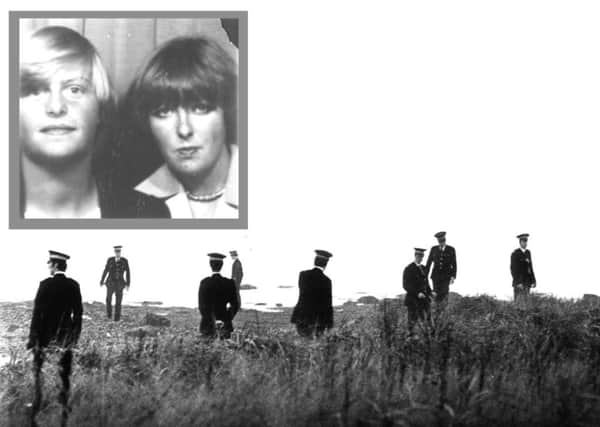World’s End jury shown ‘disturbing’ images


Angus Sinclair, 69, is on trial at Livingston High Court for the rape and murder of Christine Eadie and Helen Scott, both 17, who were last seen in the World’s End pub in the High Street in Edinburgh on the night of October 15, 1977.
Their bodies were found a few miles apart in East Lothian on the morning of October 16. Both had been strangled with items of their own clothing.
Advertisement
Hide AdAdvertisement
Hide AdToday, just days short of the anniversary of the murders, jurors viewed distressing images of the bodies, and were taken through details of their injuries.
Lord Advocate, Frank Mulholland QC, prosecuting, suggested that family members might wish to leave the court before the images were presented to the court.
But trial judge Lord Matthews suggested that it would not be fair to ask relatives of the two girls to leave if they wished to hear the evidence, and they agreed that the images would be shown to the jury but not put up on the screens on either side of the court visible to the public.
The Lord Advocate warned jurors the images would be ‘upsetting and disturbing’ and many among the nine women and six men were clearly moved, with one clearly upset at the images and covering her mouth with her hand.
Advertisement
Hide AdAdvertisement
Hide AdBearded Sinclair sat in the dock at Livingston with his eyes closed for much of the day’s proceedings.
The first day was taken up entirely with photographic evidence, the jury viewing the upsetting images of the bodies, the ligatures allegedly used to strangle them, and images of intimate swabs taken from their bodies.
Earlier, the jury had been shown where the bodies of the teenagers were left 37 years ago.
Retired police map maker Thomas Graveson, 66, said he had marked two sites in East Lothian where Christine and Helen were discovered dead.
Advertisement
Hide AdAdvertisement
Hide AdHe told the court at Livingston that Christine was found in a field near Gosford House beside the A198 road leading from Gosford Sands.
Helen, also 17, was in another field, part of Coates Farm, near a hairpin bend on the road between the villages of Coates and Huntington.
However, under cross-examination by defence counsel Iain Duguid QC, Mr Graveson admitted that the maps were recent and showed what the area looked like today rather than in 1977.
Sinclair pleads not guilty to murdering both girls after raping and strangling them while acting along with his late brother-in-law Gordon Hamilton.on October 15 and 16, 1977.
Advertisement
Hide AdAdvertisement
Hide AdHe is alleged to have forced the girls’ pants into their mouths to gag them, bound their wrists and made ligatures from their tights, belts and brassieres, which were used to restrain and strangle them.
He denies inflicting blunt force injuries on Christine by repeatedly punching and kicking her on the body and biting her.
He also denies forcing Helen to walk barefoot into a field, ripping the strap from her handbag, repeatedly punching and kicking her on the head and body and stamping on her head.
Sinclair, whose address was given as a prisoner at the prison of Glenochil, has lodged three special defences, of incrimination, consent to any sexual activity and alibi.
Advertisement
Hide AdAdvertisement
Hide AdHe claims that his brother-in-law Gordon Hamilton committed the murders, that if there was any sexual contact it was with the consent of both females, and that he was fishing to the east of Cockenzie Power Station at the time of the offences.
Sinclair, sporting a long white beard and wearing a black jacket and white T-shirt sat impassively in the dock as the two murder charges on the indictment were read out.
Judge Lord Matthews warned the jury that they should not discuss the case with friends or relatives.
He also said there could be serious consequences if they did their own research on the Internet or asked questions on social media sites.
Advertisement
Hide AdAdvertisement
Hide AdHe told them: “Please keep an open mind. During adjournments please don’t discuss it with anyone. That could taint your verdict.
“It’s important to base your verdict on the evidence you heard in court and not on anything else.”
He said the case was expected to last two to three weeks.